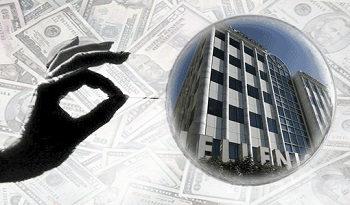Market Corrections on the Horizon
By Michael Dow
 During a recent investment seminar, a leading asset manager suggested that, "we are now living in the age of asset bubbles. It is an unchartered territory that we have never explored before and when the house of cards comes tumbling down it will make the 2008 global financial crisis look like a picnic." Sensational claims they may be, but nevertheless this pessimistic trader's sentiments do sum up what most of us are thinking with regards to a number of different bubbles that are in full swing at the moment. This month we thought it was high time to look at some of the bubbles and explore the possibility of serious market corrections over the next few months.
During a recent investment seminar, a leading asset manager suggested that, "we are now living in the age of asset bubbles. It is an unchartered territory that we have never explored before and when the house of cards comes tumbling down it will make the 2008 global financial crisis look like a picnic." Sensational claims they may be, but nevertheless this pessimistic trader's sentiments do sum up what most of us are thinking with regards to a number of different bubbles that are in full swing at the moment. This month we thought it was high time to look at some of the bubbles and explore the possibility of serious market corrections over the next few months.
The Great Chinese Bull Market
Right now Chinese equities are making history. The surge that we have seen over the last 12 months or so has been absolutely staggering and it has taken everyone by surprise. At one stage the Shanghai index had jumped by 150% from the previous year, while Shenzhen and Hong Kong shares also continued to surge after a record number of investors ploughed their money into equities.
At the moment it is pretty academic that a colossal asset bubble has been blown up. As Michael Every of Hong Kong-based Rabobank International said, "too many people are making too much money, too fast. It is greed, fear of missing out and willingness to suspend belief." The question of whether the rally will come to a screeching halt isn't really being discussed. At this stage it is more a matter of how long it can continue and how big the market correction will be. Some analysts are predicting a mild correction due to the fact that the government will support the rally in order to encourage more capital inflows. On the other hand, there are plenty of people who are likening the current situation to the build-up in U.S. equities in the 1920s and the Japanese bubble of the 1980s. If the Chinese stock markets had a caution label it would probably read"Handle with care."
Prediction: A series of big corrections within the next couple of years.
 The U.S. Double Bubble
The U.S. Double Bubble
The U.S. markets, like their Chinese counterparts, have been hitting new historical highs for months on end. Right now the S&P 500 and the Dow Jones Industrial Average are expensive to buy into but both institutional investors and individual speculators seem unable to resist buying into these markets; particularly given the persistent weakness of European assets and the intrinsic risks of investing in emerging markets. On top of that, companies have been aggressively buying back their shares. The result, as Forbes contributor Mike Patton recently pointed out, is that, "There is a small to moderate bubble at the present time. This is because stocks are overvalued. The longer existing conditions persist, the more likely it will be that a much larger bubble will ensue and the fallout could be significant. I'm not suggesting this will happen soon. Actually, I believe stocks will continue to muddle higher until interest rates rise to a sufficient level causing investors to dump stocks and redeploy their capital in bonds. Here's the point: At some future date, the bottom will fall out of the stock market and a collapse will occur."
But it isn't just the U.S. stock markets that are overinflated, the bond markets may also be in for a rough ride later this year. That's because the Federal Reserve will eventually pluck up enough courage to hike interest rates. In doing so it is feared that they will destabilise the bond markets. Other factors such as an ascent in commodity prices, worries about bad moves by the European Central Bank (ECB) and a lack of liquidity in global debt markets are also giving bond traders plenty of cause for concern. Although it probably won't do as much damage as the stock market bubbles, a correction in the bond markets will hit investors very hard indeed. In May, there was a brief sell off in which 340 billion USD worth of value was wiped off government debt markets in just a few days.
Prediction: Moderate corrections in both the stock and bond markets, but a steady rebound due to increased demand for American and dollar-denominated assets.
The FTSE Frenzy
Given that the United Kingdom has been the shining star of the developed economies over the last couple of years â as well as the strength of the pound, the financial sector and a rebound in British real estate â it is easy to see why the UK markets have been booming. The general consensus is that the outcome of the recent general election was good for the markets. Following the Conservative Party's victory there was a brief rebound in the key indexes. However since then, the FTSE 100 has been yo-yoing above and below the 7000 mark. A slowing economy, a weakening pound and the prospect of interest rate increases look likely to weigh heavy.
Prediction: Either a lengthy stagnation in asset prices or a steady downturn over the next few months.
 Emerging Market Sell-offs
Emerging Market Sell-offs
There are a number of reasons why emerging markets have lost their shine in the last couple of years. Of course there are the ongoing geopolitical tensions that are plaguing Russia and the Middle East. Brazilian assets have been a buy for the brave for some time now, with no signs of a drastic upside on the horizon. The Asian tigers are probably a safer bet in the medium term but even then the opportunities are few and far between when one considers the economic slowdown that is happening in China and the massive movement of capital out of emerging markets to the developed world.
Prediction: More geopolitical instability, a continued economic slowdown in China and the Eurozone, along with potential interest rate hikes in the United States, will put even more pressure on emerging market stocks, bonds and currencies in the months and years to come.
--END--